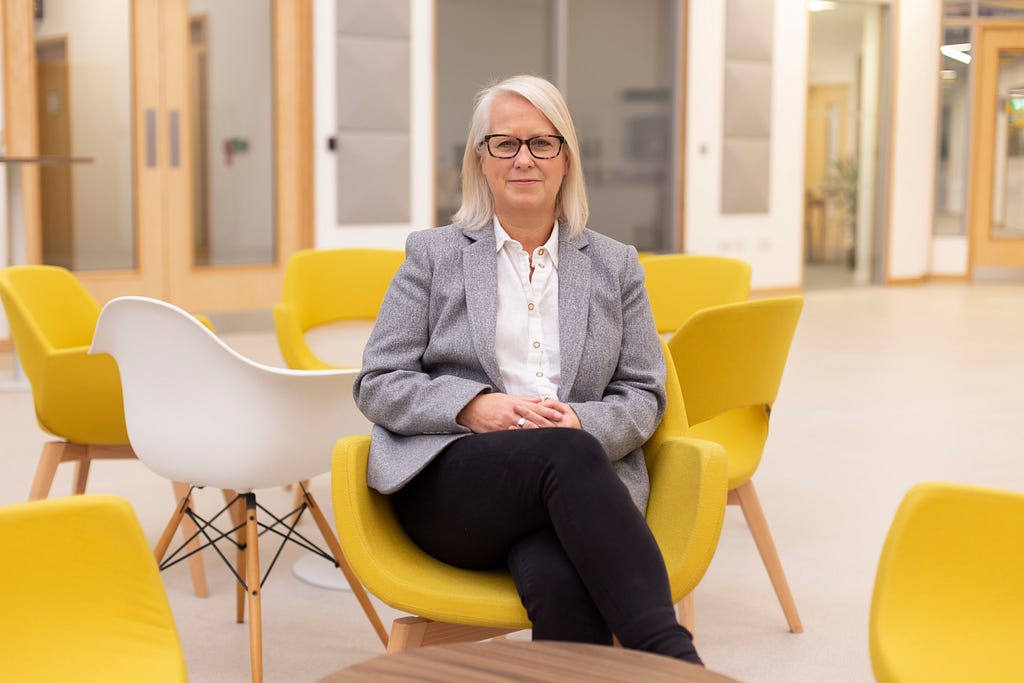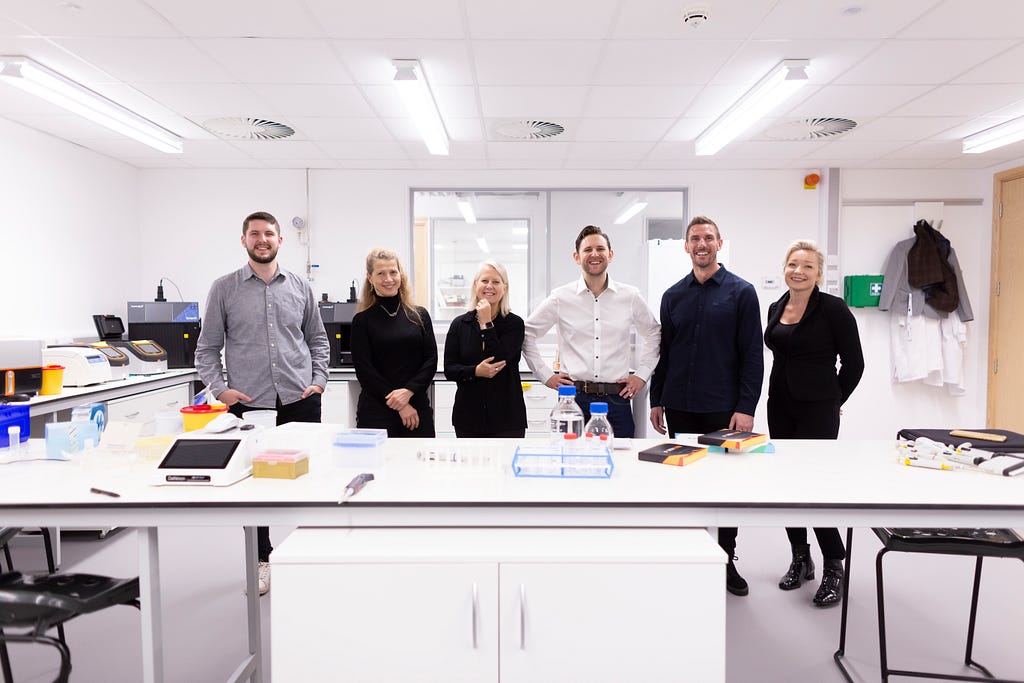An Interview With Candice Georgiadis

We need to stop devaluing women once they have children. Taking time out of your career to have children doesn’t mean that you eradicate the years of experience you have or are less ambitious or less invested in a company. We need to harness the experience these women have by offering more flexibility in the workplace whether it be flexible hours, remote working or job sharing.
As part of my series about “the five things we need to do to close the gender wage gap” I had the pleasure of interviewing Sarah Bolt. Sarah is the founder of Forth an innovative personal biometrics tracking platform, which helps people navigate their way to better health. Through her career, Sarah has worked across a number of industries from music to the global technology company Dyson, before finding a passion for supporting behaviour change within the world of healthcare. Sarah raised initial investment to launch Forth in 2017 through crowdfunding after being turned down by a number of investors. She is a strong advocate of female-led businesses especially in her home town of Bristol which has a thriving start-up community.
Thank you so much for joining us, Sarah! Can you tell us the “backstory” that brought you to this career path?
Birthdays can often be the trigger for change and it was turning 40 which was the landmark one for me. I decided I wanted a career that made a social impact, and at the time I was working as the New Product Development Manager for Dyson. The two options were politics or healthcare, and I choose the latter.
Can you share the most interesting story that happened to you since you began this career?
In the early days of the business I did a number of 15 minute investment pitches. At one such pitch I was almost superfluous to proceeding, as the investor panel spent most of the time arguing between themselves as to whether I had an investable business. I actually came out feeling quite bullish as I realised investors certainly don’t hold all the answers, and I knew more about the industry I was intending to launch in than any of them.
Can you share a story about the most interesting mistake you made when you were first starting? Can you tell us what lesson you learned from that?
I think you often underestimate what it takes to start a business and the stress it puts you under. When we were trying to raise initial investment, I took my laptop on holiday with the intention to work on the investment deck. It was a huge mistake. On day one my son, then aged 10, accidentally spilt a full glass of fizzy drink onto the keyboard. The laptop never switched on again and I learnt the lesson that family holidays and work should never mix! You have to choose one or the other and give yourself a break (as well as giving your family a break from seeing you constantly at the keyboard).
Ok let’s jump to the main focus of our interview. Even in 2019, women still earn about 80 cents for every dollar a man makes. Can you explain three of the main factors that are causing the wage gap?
- I think women under-sell themselves. When a woman looks at a job specification, they think ‘I can do 80% of it’ then worry about the remaining 20% they may have little experience with. Men however go with the approach, ‘I can do 80%, therefore I am perfect for the role’. Men believe more in themselves and believe they are worth it. We undervalue ourselves and don’t push ourselves forward as much as men do.
- I believe that some women are more focused on achieving work/life/value balance rather than the pure monetary element of a job. They opt for a salary that gets them by, and enables them to do things they want to do. Because of that, they are not always pushing on earning more.
- When management teams are majority-led by men, there is the risk of inequality. They try to get away with what they can and women don’t push hard enough.
Can you share with our readers what your work is doing to help close the gender wage gap?
We are looking to balance our workforce and to ensure that regardless of gender there is a straightforward pay level. For example, at the moment we have an all male tech team, but our next techie recruit has to be female. There isn’t a difference on pay by gender but on skills, and as a female founder it is really important to me that we are building a business that has both the right environment for women and for all to develop regardless of gender.
Can you recommend 5 things that need to be done on a broader societal level to close the gender wage gap. Please share a story or an example for each.
- We need more women at the heads of business. It needs to be the norm rather than the anomaly. In Fortune’s list of the top 500 companies, females make up fewer than 3.1 % of executive staff.
- To do this, women need to be seen as less of ‘a risk’ and viewed more as ‘an opportunity’ in line with men. The risk/opportunity gender imbalance is highly visible in the investment world where female-led start-ups which only get 7% of total venture funding.
- We need to stop devaluing women once they have children. Taking time out of your career to have children doesn’t mean that you eradicate the years of experience you have or are less ambitious or less invested in a company. We need to harness the experience these women have by offering more flexibility in the workplace whether it be flexible hours, remote working or job sharing.
- Looking more broadly at society, we need to encourage girls at a very young age that anything is possible, getting them more involved in business with female role models in business being visible. These role models are not held up as the norm, but they should be. Successful women in business are the norm.
- We need more transparency in salary scales in companies. This is clear in the public sector where it is equitable, however there is plenty of obfuscation in the private sector resulting in a discrepancy in salaries based on gender.

You are a person of great influence. If you could inspire a movement that would bring the most amount of good to the most amount of people, what would that be? You never know what your idea can trigger. 🙂
I would campaign for compulsory food technology lessons in schools for all kids up until the age of 16. Type 2 diabetes is the biggest growing health epidemic facing the modern world. Gaining knowledge of food and cooking is so crucial to our future health and it should have the same importance as Maths or English. We need to encourage the next generation not to grab for sugar laden snacks and the ready-made processed option at mealtimes.
Can you please give us your favorite “Life Lesson Quote”? Can you share how that was relevant to you in your life?
“No one can make you feel inferior without your consent.” Eleanor Roosevelt.
This really speaks to my belief that a key element of what holds some women back is a lack of self-belief. This is something they need to overcome to build equality. I’ve experienced this many times myself, especially when I originally founded the business and was seeking seed investment. These days I’m far more bullish and embrace more of a ‘Yes, I can’ attitude.
We are very blessed that some of the biggest names in Business, VC funding, Sports, and Entertainment read this column. Is there a person in the world, or in the US whom you would love to have a private breakfast or lunch with, and why? He or she might see this, especially if we tag them. 🙂
Given my line of work it has to be Elizabeth Holmes –the disgraced founder of Theranos, now one of Silicon Valley’s biggest fraud cases. The book ‘Bad Blood’ which charts the journey of Elizabeth and Theranos is truly jaw dropping. Elizabeth’s vision was to provide technology that provided a wealth of information on the health of a person using a tiny sample of blood. She raised $400 million and the company was at one point valued at $9bn.
However, it turned out that she didn’t have the tech and is now facing criminal fraud charges. She started with an amazing vision, and I’m sure similar to many people who go into healthcare she was driven by the desire to make a positive impact on people’s lives. I’d really like to sit down with Elizabeth and ask her when did she lose sight of this. When did human life become less important than ‘success at all costs’.
This was really meaningful! Thank you so much for your time.
“5 Things We Need To Do To Close The Gender Wage Gap”, with Sarah Bolt of Forth was originally published in Authority Magazine on Medium, where people are continuing the conversation by highlighting and responding to this story.

